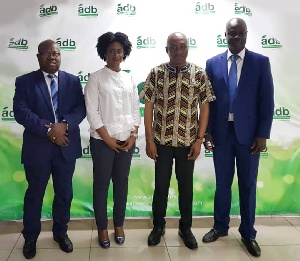Agricultural Development Bank (ADB) and Ghana Commodity Exchange (GCX) on 3rd December 2018 signed a Memorandum of Understanding (MOU) to provide a range of financial services including warehouse receipts financing, aggregation financing and settlement of trades to farmers.
The Bank will lend to Ghanaian smallholder farmers who only have their commodity as the sole collateral to present to the bank as the security for a loan.
The GCX as part of its operations would provide a first-class warehouse collateral management service, warehouse Insurance and Indemnities, as well as stock information and market prices to reduce the bank’s lending risks.
This is in line with Government’s resolve to ensure financial inclusion amongst rural communities largely dominated by smallholder farmers.
At the recent inauguration of the GCX, the Honourable Minister of Finance, Ken Ofori-Atta hinted that ADB will be restructured to support Ghanaian farmers through the warehouse receipt system.
Speaking at the signing of the MoU, the Managing Director of ADB, Dr John Kofi Mensah, stated that the Agricultural Development Bank is fully committed to supporting farmers to improve their access to financing.
The Bank is a major player in the implementation of the planting for food and jobs and one district, one factory agricultural related projects and stressed the need for fair pricing modules to assist the entire Agric value chain.
On his part, the Chief Executive Officer of the GCX, Dr Kadri Alfah expressed optimism that the partnership between the GCX and ADB will go a long way to help smallholder farmers as well as help to promote the GCX model.
He stated "Agricultural Development Bank has an extensive network of branches with proximity to commodity production areas which suits our business model, and perfectly supports our warehouse receipts financing programme. ADB’s readiness to support GCX electronic warehouse receipt program is good for the country and the financial market’s environment as we can see a collaborative effort among institutions with a national focus, work to meet a collective need. It is important that we encourage more commercial banks with enormous private capital to take interest in smallholder farmers who contribute about 20% of our GDP, and responsible for almost 50% of our employment. But of course, we need to help the banks to manage their default and credit risks’’.
Business News of Wednesday, 5 December 2018
Source: ADB Ghana

















